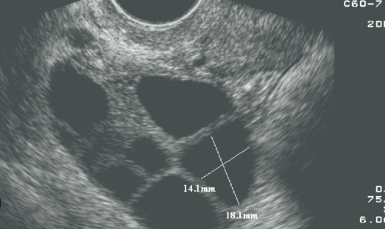What Do Follicles in Ovary Ultrasound Mean for Your Fertility?

Introduction
Are you wondering what those tiny follicles in your ovary ultrasound mean for your fertility? As a woman, it’s natural to be curious about the health of your reproductive system and how it affects your chances of conceiving. Understanding the significance of ovarian follicles is key to unlocking many mysteries surrounding female fertility. In this blog post, we’ll explore everything there is to know about follicles in ovary ultrasounds and what they could mean for you. So grab a cup of tea and let’s dive in!
What is an ovarian follicle?
The ovarian follicle is a small, fluid-filled sac that develops in the ovary. It contains an immature egg or oocyte and is surrounded by cells that produce hormones necessary for fertility.
Each month, several follicles begin to develop within the ovaries due to hormonal signals from the brain. However, only one will mature fully and be released during ovulation while others will regress.
The size of the follicle can vary throughout its development stages, with mature ones measuring around 18-20mm before ovulation occurs.
Ovarian follicles are monitored through ultrasound scans where their number and size can provide important information about a woman’s fertility potential. Follicular tracking also helps determine if there are any issues with ovulation or if medical intervention may be necessary.
Understanding what ovarian follicles are and how they function within the reproductive system plays an essential role in identifying any underlying problems related to infertility or other gynecological concerns.
What does it mean if you have multiple follicles in one ovary?
If you have multiple follicles in one ovary, it means that your ovaries are working harder than usual to produce eggs. Ovarian follicles contain immature eggs and usually only one of them matures into an egg each month during a menstrual cycle.
However, some women may have more than one mature follicle due to certain medications or conditions such as polycystic ovary syndrome (PCOS). In this case, the extra follicles can increase the chance of ovulation and pregnancy.
On the other hand, having multiple small follicles may indicate a condition called “polycystic ovaries” which is associated with hormonal imbalances and irregular periods. While it doesn’t necessarily mean infertility, it can make it difficult for these women to conceive naturally without medical intervention.
It’s important to note that having multiple follicles in one ovary does not always affect fertility negatively or positively. It depends on various factors such as age, overall health status and any underlying medical issues that need addressing before trying to conceive. Consulting with a healthcare professional is recommended for personalized advice.
What does it mean if you have cysts on your ovaries?
Cysts on the ovaries are fluid-filled sacs that form on or inside the ovaries. These cysts can be normal and harmless, but they can also indicate an underlying condition that may affect fertility.
Some common types of ovarian cysts include follicular cysts, which develop when a follicle fails to release an egg; corpus luteum cysts, which form after ovulation; and endometriomas, which result from endometrial tissue growing outside of the uterus.
In many cases, small ovarian cysts do not cause any symptoms or require treatment. However, larger cysts can cause pain or discomfort in the lower abdomen or pelvis. If left untreated, certain types of ovarian cysts can lead to complications such as torsion (twisting) of the ovary or rupturing of the cyst.
Cysts on the ovaries can also impact fertility by interfering with ovulation or causing hormonal imbalances. Women who have polycystic ovary syndrome (PCOS) often experience irregular menstrual cycles and difficulty getting pregnant due to multiple small cysts on their ovaries.
If you suspect you may have an ovarian cyst, it’s important to speak with your healthcare provider for proper diagnosis and management. Treatment options may include watchful waiting for smaller noncancerous cysts or surgical removal if necessary.
How do these things affect fertility?
Having multiple follicles in one ovary or cysts on your ovaries may affect fertility in different ways.
Firstly, having multiple follicles does not necessarily mean that they will all mature and release an egg during ovulation. In fact, some women with many small follicles may have difficulty conceiving because none of them reach full maturity. On the other hand, having a few large and healthy follicles is typically associated with higher chances of successful conception.
Secondly, ovarian cysts can also affect fertility depending on their type and size. Functional cysts that develop during the menstrual cycle usually resolve on their own without causing problems, but if they grow too large or persist for several cycles they may need medical attention. Other types of cysts such as endometriomas or dermoid cysts can cause damage to the ovary tissue and reduce its function over time.
It’s important to note that these factors are only a piece of the puzzle when it comes to fertility. Many other variables such as age, hormonal imbalances and health conditions can influence a woman’s ability to conceive naturally or through assisted reproductive technologies (ART). Seeking advice from a healthcare provider is recommended for couples who have been trying to conceive unsuccessfully for more than 12 months (or six months if over 35 years old).
Conclusion
Understanding the follicles in ovary ultrasound is crucial for women who are trying to conceive. The number of follicles present can indicate whether a woman has a good chance of getting pregnant or not.
Having multiple follicles on one ovary may be an indication of PCOS, which can lead to infertility if left untreated. On the other hand, having cysts on your ovaries does not necessarily mean that you will have fertility issues.
It is important to note that there is no sure way to determine fertility solely based on ovarian ultrasounds. Other factors such as age and overall health also play a role in determining fertility.
If you are concerned about your fertility or have been trying to get pregnant without success, it’s best to speak with your doctor. They can provide guidance on next steps and potential treatments.
In summary, while ovarian ultrasounds can provide insight into a woman’s fertility potential through the examination of follicle growth and presence of cysts, it should only be used as one piece of information among many when assessing reproductive health.




